module 3 unit3 back to the back[下学期]
文档属性
| 名称 | module 3 unit3 back to the back[下学期] |
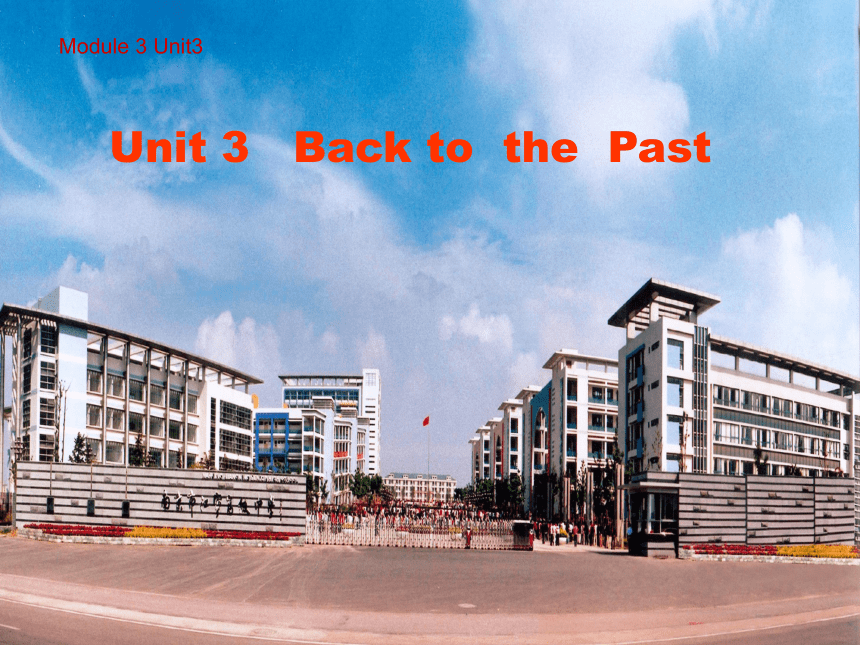
|
|
| 格式 | rar | ||
| 文件大小 | 3.4MB | ||
| 资源类型 | 教案 | ||
| 版本资源 | 牛津译林版 | ||
| 科目 | 英语 | ||
| 更新时间 | 2006-05-08 00:00:00 | ||
图片预览

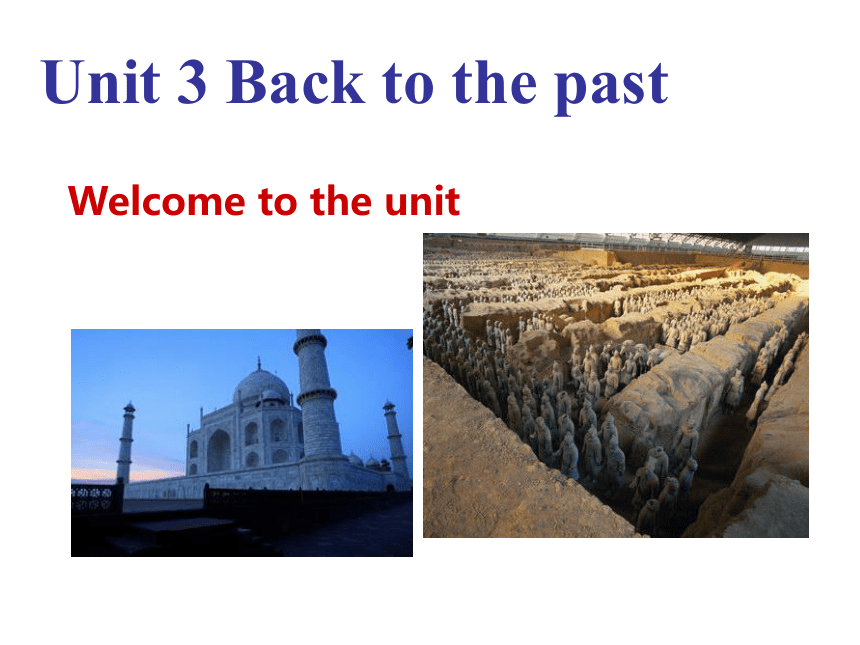
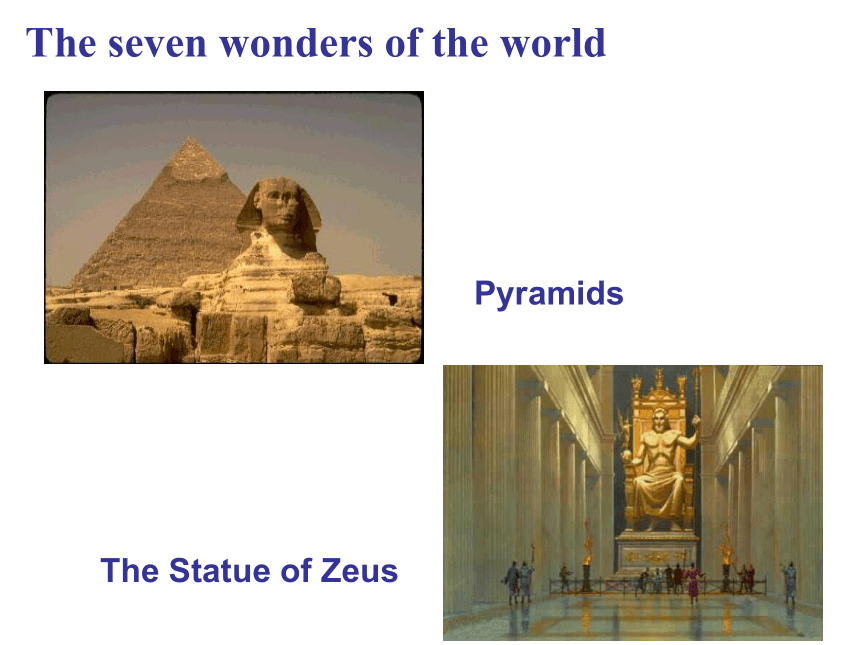
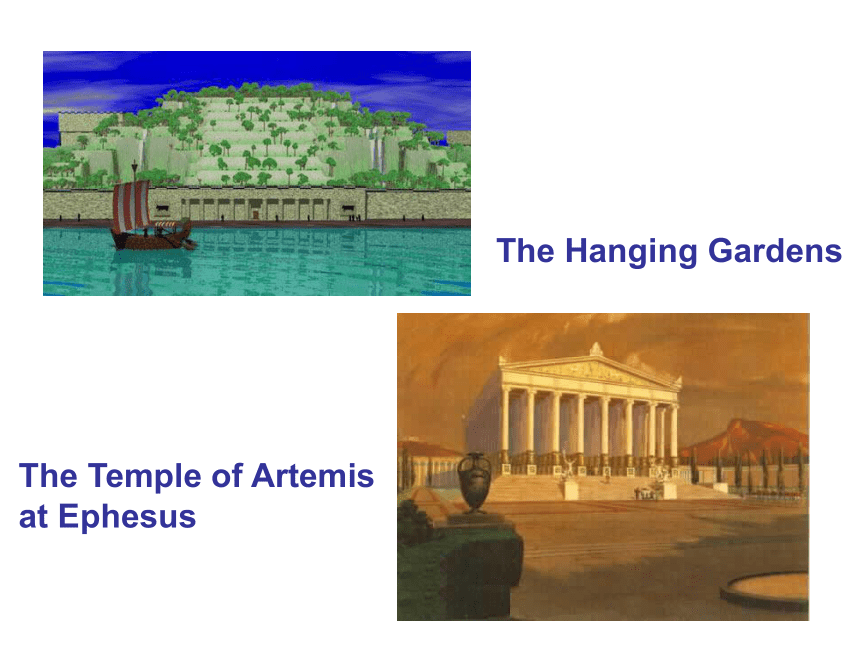
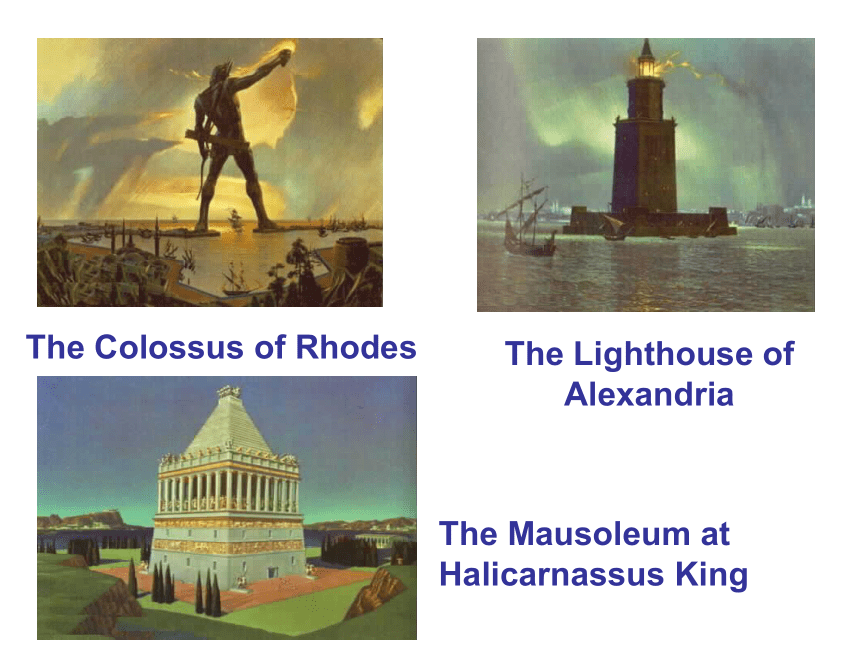
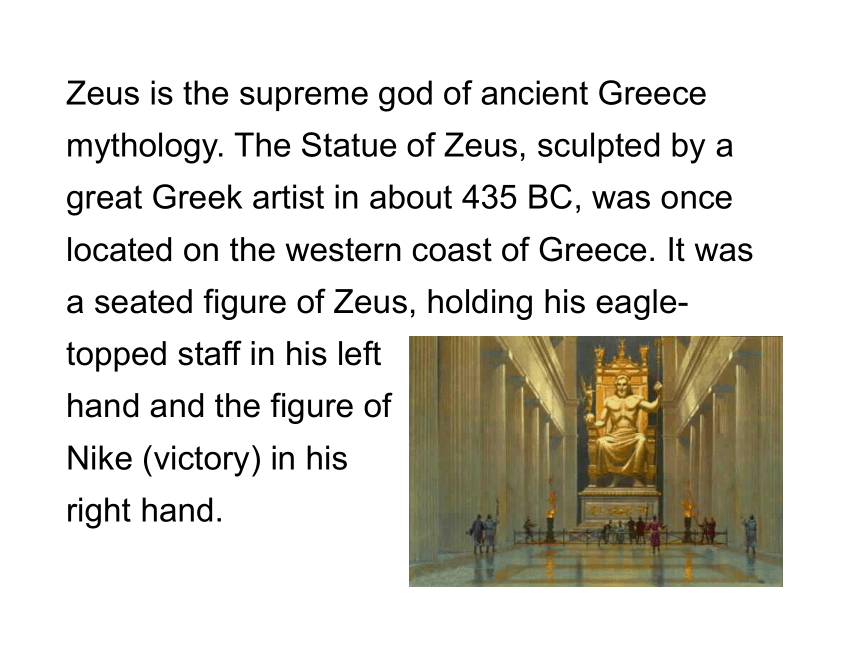
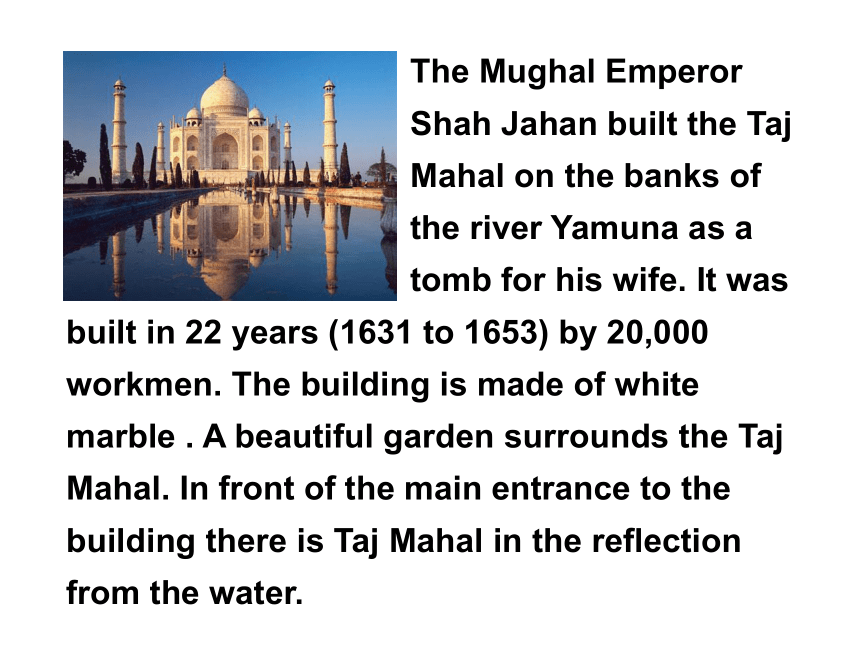
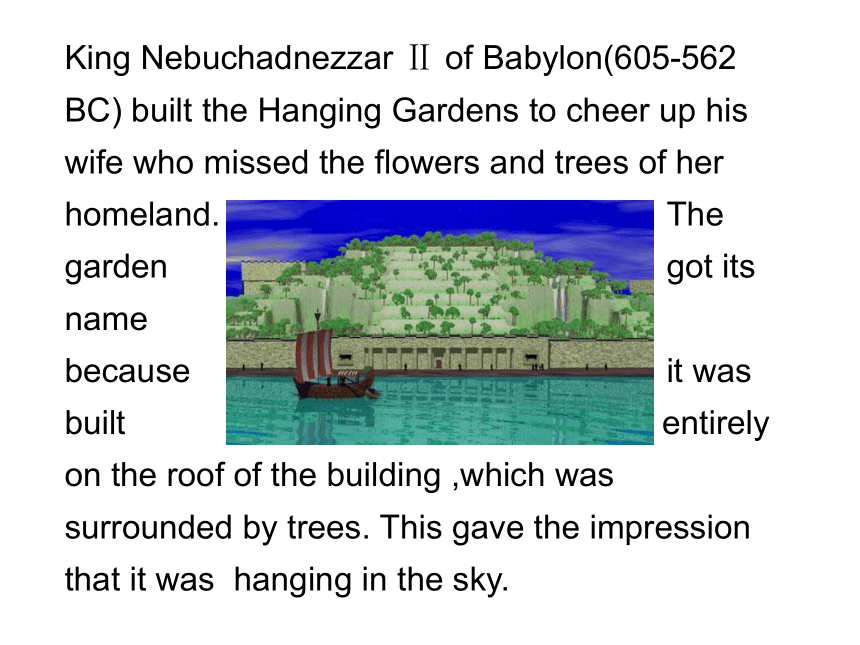
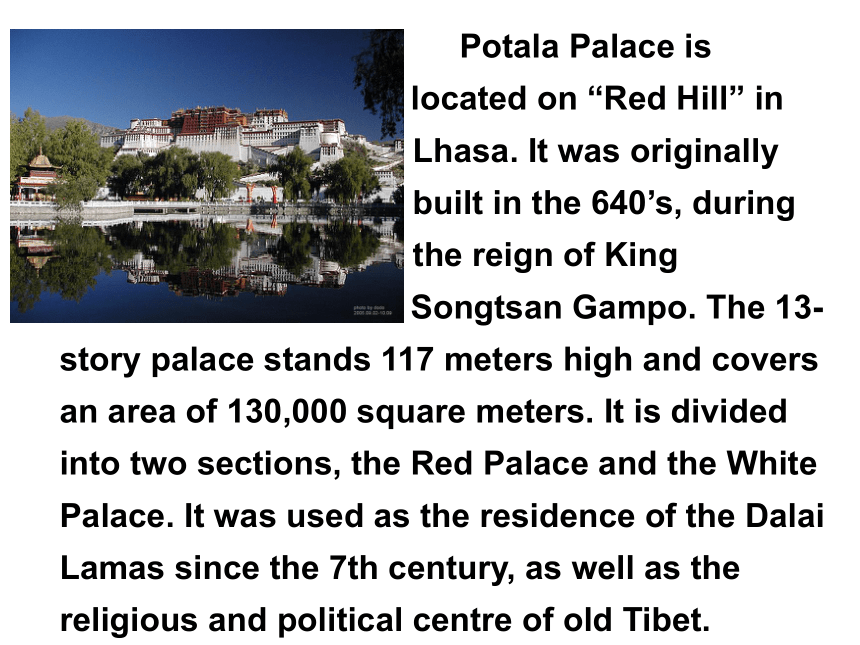
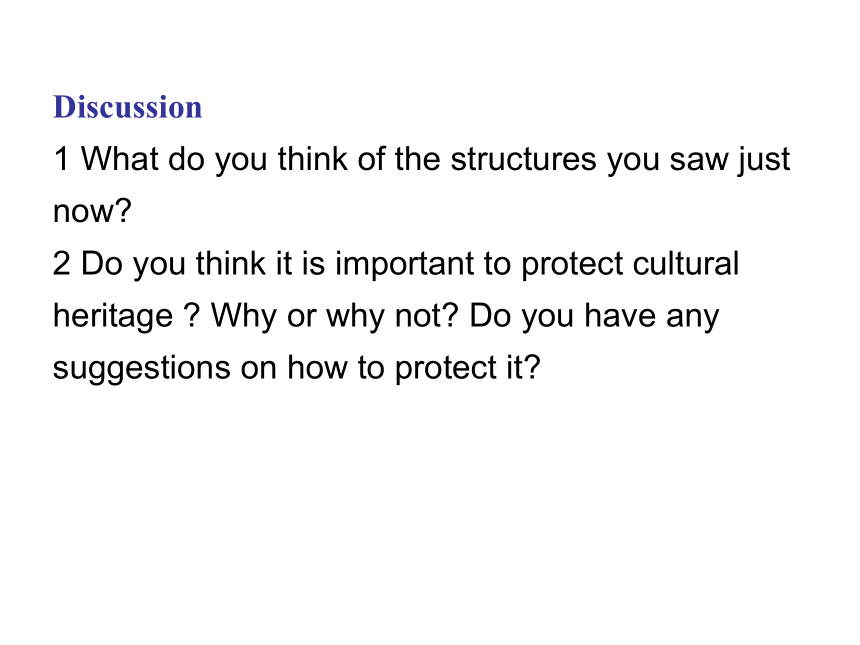
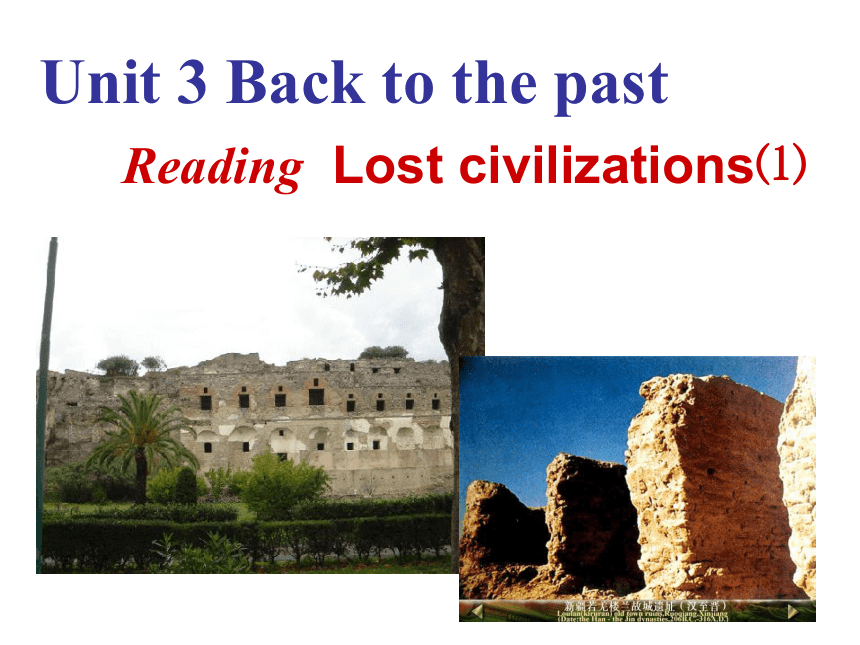
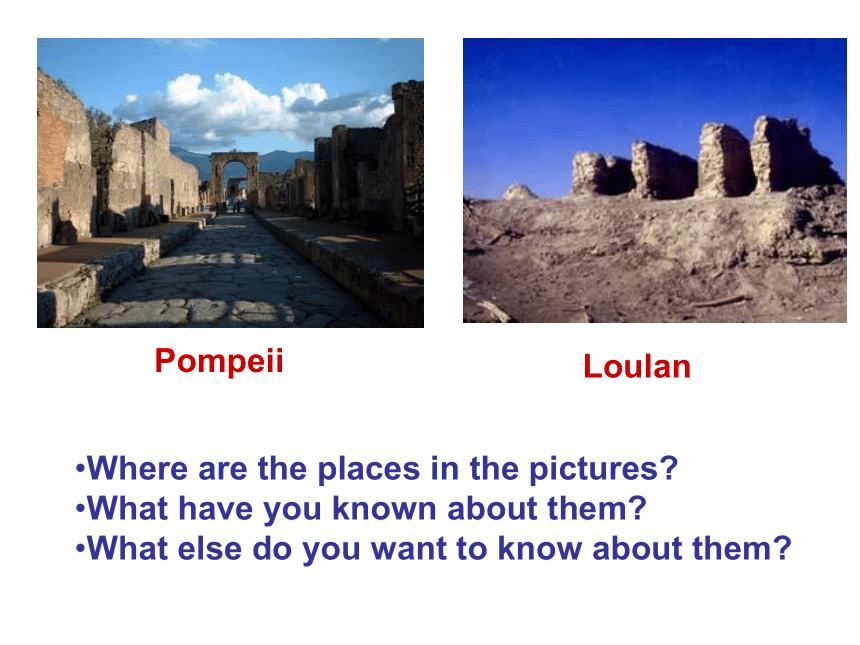
文档简介
课件30张PPT。Module 3 Unit3Unit 3 Back to the PastUnit 3 Back to the pastWelcome to the unitPyramidsThe Statue of ZeusThe seven wonders of the world The Hanging GardensThe Temple of Artemis at EphesusThe Colossus of RhodesThe Lighthouse of
Alexandria The Mausoleum at
Halicarnassus KingZeus is the supreme god of ancient Greece
mythology. The Statue of Zeus, sculpted by a great Greek artist in about 435 BC, was once located on the western coast of Greece. It was a seated figure of Zeus, holding his eagle-topped staff in his left
hand and the figure of
Nike (victory) in his
right hand. The Mughal Emperor Shah Jahan built the Taj Mahal on the banks of the river Yamuna as a tomb for his wife. It was built in 22 years (1631 to 1653) by 20,000 workmen. The building is made of white marble . A beautiful garden surrounds the Taj Mahal. In front of the main entrance to the building there is Taj Mahal in the reflection from the water. King Nebuchadnezzar Ⅱ of Babylon(605-562 BC) built the Hanging Gardens to cheer up his wife who missed the flowers and trees of her homeland. The garden got its name because it was built entirely on the roof of the building ,which was surrounded by trees. This gave the impression that it was hanging in the sky. Potala Palace is located on “Red Hill” in Lhasa. It was originally built in the 640’s, during the reign of King Songtsan Gampo. The 13-story palace stands 117 meters high and covers an area of 130,000 square meters. It is divided into two sections, the Red Palace and the White Palace. It was used as the residence of the Dalai Lamas since the 7th century, as well as the religious and political centre of old Tibet.Discussion
1 What do you think of the structures you saw just
now?
2 Do you think it is important to protect cultural heritage ? Why or why not? Do you have any suggestions on how to protect it?Reading Lost civilizations⑴Unit 3 Back to the pastWhere are the places in the pictures?
What have you known about them?
What else do you want to know about them?PompeiiLoulan1. What country is the author from?
2. What is one main similarity between Pompeii and Loulan?
3. Who was made director of the Pompeii dig in 1860?
4. Who is Professor Zhang?Canada.Both of them became lost civilization about 2,000
years ago.The Italian archaeologist Giuseppe Fiorelli.An archaeologist from the local cultural institute. A Read the diary entries quickly and answer these questions.C1 How well did you understand the details in the diary? Read it
again carefully and answer the following questions.What happened to Pompeii in August AD 79?
2. How was the buried city discovered?
Mount Vesuvius erupted and lava, ash and rocks
poured out of it onto the surrounding countryside.
All the people in Pompeii were buried alive, and
so was the city.It was discovered in the 18th century when a farmer
found some stone with writing on it. People started
to dig in the area for treasure, which caused much
damage. So in 1860, the Italian archaeologist
Giuseppe Fiorelli was made director of the Pompeii
dig.3. What were the stepping stones along the road in
Pompeii used for?
4. Why was Loulan an important city about 2,000
years ago?
5. How do many people think Loulan disappeared?
6. According to the last sentence, how did the author
feel about the loss of Loulan?With the stones, people did not have to step in the
mud in the streets on rainy days.Because it was a stopping point on the famous Silk
Road between the East and the WestIt was gradually covered over by sandstorms from
AD 200 to AD 500.She felt that it was a pity! 1 I feel lucky to have won a place on this trip.
2 This morning we went to a lecture about Pompeii.
3 Unfortunately, all the people were buried alive, and so was the city !
4 How amazing ! C2 The writers of diaries often record feelings or opinions
(emotions) as well as what they have done(actions). Do the
sentences below express emotions(E) or actions(A)? E / A
E / A
E / A
E / A5 People started to dig in the area for treasure.
When I walked around the city, I saw streets just as they had been.
I am so excited to be here!
8 Sven found the remains of building buried under
the sand. E / A
E / A
E / A
E / A1 the city
2 which
3 there
4 it
5 thatD2 Find the following words in the text and decide what they
refer to.Pompeiithe fact that people started to dig
in the area for treasurenear PompeiiLoulanthe fact that the desert was once a
green land with enormous treesReading strategy: reading diary entriesWhen you are reading diary entries recording someone’s travels, you should look for:
⑴
⑵
⑶dates and place namesfacts and historical informationpersonal feelings and opinionsIt was founded.It was taken over by
the Romans.Mount Vesuvius erupted. Giuseppe Fiorelli was made
director of the Pompeii dig.It existed as a commercial city.It was covered over
gradually by sand storms.It was discovered by a
Swedish explorer. Find the historical information about Pompeii and Loulan.Discussion
Is it useful for people to study things from the past? Why or why not?
Since as long ago as 1553 people have said, ‘History repeats itself.’ What do you think this saying means? Do you agree with it? Why or why not?Homework
Read the passage carefully and review the new
words and phrases.
2. Make a summary of the text.Reading Lost civilizations⑵Unit 3 Back to the pastBoth Pompeii in ________and Loulan in China became ____ ________ about 2000 years ago. Pompeii was ________ in the 8th century BC and was _____ _______ by the Romans in 89BC. On 24th Aug.AD79, Mount Vesuvius _________ and the city were _______ __________. Loulan was a _________ _________ on the Silk Road. It disappeared under the ________. There are just a few _________ left. Some _________, such as coins and painted pots, was found.Fill in the blanks with proper words.Italy IostcivilizationsfoundedtakenovereruptedburiedalivestoppingpointstormruinstreasureGive the English words according to the definitions.(of a volcano)throw out of
lava and ash act or speak for a group sadly ,unluckily rich parts of a building that remain
after it has been badly
damaged or destroyed huge take control of provide space foreruptrepresentunfortunately wealthy ruinsenormoustake overhouseWord study1. represent vt.1) act or speak for a groupThe competition attracted over 500 contestants
8 different countries.representingThe President was at the ceremony by the Vice-President.represented2) to be a symbol of Each color on the chart a different department.representsThe rose a different department.represents2. take over: take control ofThe army has the party.
The firm has by a large company.
When he was ill his son the business.taken overbeen taken overtook over3. unfortunately adv. unluckily, regrettably , he was injured in the first game.
,I won’t be able to attend the meeting.Unfortunately Unfortunately unfortunate adj. It was an accident.
It is that you missed the meeting.unfortunate unfortunate 4. alive adj. living, not deadShe was still when she was sent to the hospital.
He was buried in the earthquake.alivealive*live, living, livelyShe’s a child and popular with everyone.
fish
coverage of the World Cup
languages
livelyliveliveliving5. destroy vt. to damage sth. so badly that it no longer exists, worksThe building was by fire.
They’ve all the evidence.
Her husband was killed in the war, which_________
her hopes of happiness.destroyeddestroyed6. house vt. to provide a space forThe government will take measures to the refugees.
The gallery 2000 works of modern art.househousesdestroyed7. prevent sb./sth. (from) doing sth.:
stop sb. from doing sth.Nothing will us (from) reaching our aims.
I was by illness from taking the exam.preventprevented8. Tom has been to the Great Wall twice,
and . (他妹妹也去过两次)
If you go there, . (我也去)so has his sisterso shall I
Alexandria The Mausoleum at
Halicarnassus KingZeus is the supreme god of ancient Greece
mythology. The Statue of Zeus, sculpted by a great Greek artist in about 435 BC, was once located on the western coast of Greece. It was a seated figure of Zeus, holding his eagle-topped staff in his left
hand and the figure of
Nike (victory) in his
right hand. The Mughal Emperor Shah Jahan built the Taj Mahal on the banks of the river Yamuna as a tomb for his wife. It was built in 22 years (1631 to 1653) by 20,000 workmen. The building is made of white marble . A beautiful garden surrounds the Taj Mahal. In front of the main entrance to the building there is Taj Mahal in the reflection from the water. King Nebuchadnezzar Ⅱ of Babylon(605-562 BC) built the Hanging Gardens to cheer up his wife who missed the flowers and trees of her homeland. The garden got its name because it was built entirely on the roof of the building ,which was surrounded by trees. This gave the impression that it was hanging in the sky. Potala Palace is located on “Red Hill” in Lhasa. It was originally built in the 640’s, during the reign of King Songtsan Gampo. The 13-story palace stands 117 meters high and covers an area of 130,000 square meters. It is divided into two sections, the Red Palace and the White Palace. It was used as the residence of the Dalai Lamas since the 7th century, as well as the religious and political centre of old Tibet.Discussion
1 What do you think of the structures you saw just
now?
2 Do you think it is important to protect cultural heritage ? Why or why not? Do you have any suggestions on how to protect it?Reading Lost civilizations⑴Unit 3 Back to the pastWhere are the places in the pictures?
What have you known about them?
What else do you want to know about them?PompeiiLoulan1. What country is the author from?
2. What is one main similarity between Pompeii and Loulan?
3. Who was made director of the Pompeii dig in 1860?
4. Who is Professor Zhang?Canada.Both of them became lost civilization about 2,000
years ago.The Italian archaeologist Giuseppe Fiorelli.An archaeologist from the local cultural institute. A Read the diary entries quickly and answer these questions.C1 How well did you understand the details in the diary? Read it
again carefully and answer the following questions.What happened to Pompeii in August AD 79?
2. How was the buried city discovered?
Mount Vesuvius erupted and lava, ash and rocks
poured out of it onto the surrounding countryside.
All the people in Pompeii were buried alive, and
so was the city.It was discovered in the 18th century when a farmer
found some stone with writing on it. People started
to dig in the area for treasure, which caused much
damage. So in 1860, the Italian archaeologist
Giuseppe Fiorelli was made director of the Pompeii
dig.3. What were the stepping stones along the road in
Pompeii used for?
4. Why was Loulan an important city about 2,000
years ago?
5. How do many people think Loulan disappeared?
6. According to the last sentence, how did the author
feel about the loss of Loulan?With the stones, people did not have to step in the
mud in the streets on rainy days.Because it was a stopping point on the famous Silk
Road between the East and the WestIt was gradually covered over by sandstorms from
AD 200 to AD 500.She felt that it was a pity! 1 I feel lucky to have won a place on this trip.
2 This morning we went to a lecture about Pompeii.
3 Unfortunately, all the people were buried alive, and so was the city !
4 How amazing ! C2 The writers of diaries often record feelings or opinions
(emotions) as well as what they have done(actions). Do the
sentences below express emotions(E) or actions(A)? E / A
E / A
E / A
E / A5 People started to dig in the area for treasure.
When I walked around the city, I saw streets just as they had been.
I am so excited to be here!
8 Sven found the remains of building buried under
the sand. E / A
E / A
E / A
E / A1 the city
2 which
3 there
4 it
5 thatD2 Find the following words in the text and decide what they
refer to.Pompeiithe fact that people started to dig
in the area for treasurenear PompeiiLoulanthe fact that the desert was once a
green land with enormous treesReading strategy: reading diary entriesWhen you are reading diary entries recording someone’s travels, you should look for:
⑴
⑵
⑶dates and place namesfacts and historical informationpersonal feelings and opinionsIt was founded.It was taken over by
the Romans.Mount Vesuvius erupted. Giuseppe Fiorelli was made
director of the Pompeii dig.It existed as a commercial city.It was covered over
gradually by sand storms.It was discovered by a
Swedish explorer. Find the historical information about Pompeii and Loulan.Discussion
Is it useful for people to study things from the past? Why or why not?
Since as long ago as 1553 people have said, ‘History repeats itself.’ What do you think this saying means? Do you agree with it? Why or why not?Homework
Read the passage carefully and review the new
words and phrases.
2. Make a summary of the text.Reading Lost civilizations⑵Unit 3 Back to the pastBoth Pompeii in ________and Loulan in China became ____ ________ about 2000 years ago. Pompeii was ________ in the 8th century BC and was _____ _______ by the Romans in 89BC. On 24th Aug.AD79, Mount Vesuvius _________ and the city were _______ __________. Loulan was a _________ _________ on the Silk Road. It disappeared under the ________. There are just a few _________ left. Some _________, such as coins and painted pots, was found.Fill in the blanks with proper words.Italy IostcivilizationsfoundedtakenovereruptedburiedalivestoppingpointstormruinstreasureGive the English words according to the definitions.(of a volcano)throw out of
lava and ash act or speak for a group sadly ,unluckily rich parts of a building that remain
after it has been badly
damaged or destroyed huge take control of provide space foreruptrepresentunfortunately wealthy ruinsenormoustake overhouseWord study1. represent vt.1) act or speak for a groupThe competition attracted over 500 contestants
8 different countries.representingThe President was at the ceremony by the Vice-President.represented2) to be a symbol of Each color on the chart a different department.representsThe rose a different department.represents2. take over: take control ofThe army has the party.
The firm has by a large company.
When he was ill his son the business.taken overbeen taken overtook over3. unfortunately adv. unluckily, regrettably , he was injured in the first game.
,I won’t be able to attend the meeting.Unfortunately Unfortunately unfortunate adj. It was an accident.
It is that you missed the meeting.unfortunate unfortunate 4. alive adj. living, not deadShe was still when she was sent to the hospital.
He was buried in the earthquake.alivealive*live, living, livelyShe’s a child and popular with everyone.
fish
coverage of the World Cup
languages
livelyliveliveliving5. destroy vt. to damage sth. so badly that it no longer exists, worksThe building was by fire.
They’ve all the evidence.
Her husband was killed in the war, which_________
her hopes of happiness.destroyeddestroyed6. house vt. to provide a space forThe government will take measures to the refugees.
The gallery 2000 works of modern art.househousesdestroyed7. prevent sb./sth. (from) doing sth.:
stop sb. from doing sth.Nothing will us (from) reaching our aims.
I was by illness from taking the exam.preventprevented8. Tom has been to the Great Wall twice,
and . (他妹妹也去过两次)
If you go there, . (我也去)so has his sisterso shall I
